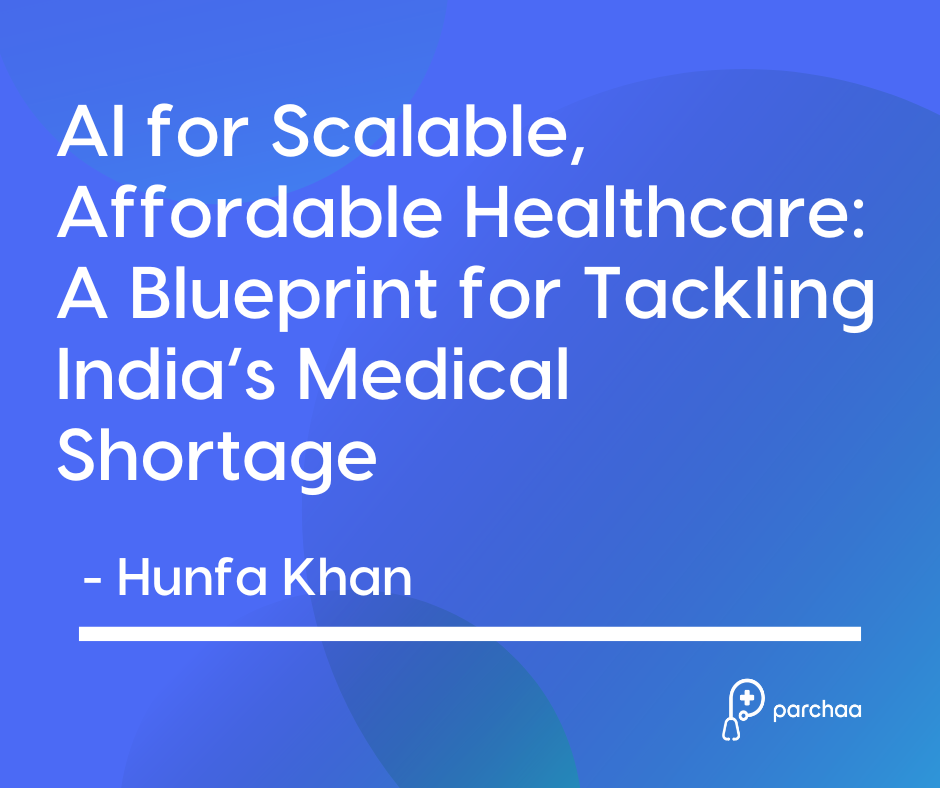Contact Us
If you have any questions, feedback, or need assistance, our dedicated support team is here to help.

Framing the Crisis: Why India Needs Scalable Healthcare Now
India is a nation of more than 1.4 billion people. It faces a severe shortage of medical professionals, particularly in rural and underserved areas. Currently, the doctor-patient ratio in India is about one doctor for every 1,500 people, which is significantly below the World Health Organization’s recommended standard of one doctor per 1,000 people. This shortage results in overburdened doctors who often have only around two minutes to spend with each patient. Such limited consultation time increases the risk of misdiagnosis and reduces patient satisfaction. The problem is intensified by barriers such as limited infrastructure, high treatment costs, and the rising burden of chronic diseases. This makes it critical to explore scalable and technology-driven approaches to healthcare delivery immediately to protect public health and economic growth.
The Double-Edged Promise of AI in Healthcare
Artificial intelligence holds transformative potential for making healthcare more accessible, affordable, and higher quality. Globally, AI-powered diagnostic tools have improved early disease detection accuracy by as much as 30%. Additionally, automation of administrative tasks in hospitals has reduced workloads by nearly 40%, freeing clinicians for direct patient care. However, there are important challenges. These include risks of algorithmic bias that can affect fairness, concerns over data privacy and security, and uncertainties in regulatory environments. Successful adoption of AI in healthcare requires transparent algorithms, strong data governance, and active involvement of educators and healthcare practitioners to build trust and effectiveness over time.
Parchaa by PanScience: India’s Digital Medical Saathi
Parchaa is not merely an AI health platform. It is a comprehensive digital medical companion purpose-built for India's unique healthcare challenges. Comprising 27 modular AI tools, it empowers doctors, streamlines hospital workflows, and connects patients with quality care. From automating appointment booking and records management to providing clinical decision support and patient self-assessment tools, every feature is designed to be accessible, scalable, and evidence-based.
What Sets Parchaa Apart?
- Early Compliance with ABDM Standards: Parchaa has been among the first startups certified under the Ayushman Bharat Digital Mission (ABDM), ensuring seamless and secure interoperability within India’s healthcare ecosystem.
- AI-Powered Clinical Decision Support: Its Clinical Decision Support System (CDSS+) combines the latest machine learning algorithms with clinical guidelines tailored for urban and rural medical practice, enhancing diagnostic accuracy and treatment planning.
- Bridging Healthcare Access Gaps: AI-driven symptom checkers, digital health records, and remote triage systems enable patients, especially in rural areas, to receive timely medical evaluation and consultation without traveling long distances.
- Robust Data Privacy Safeguards: Parchaa employs stringent data encryption, role-based access controls, and informed consent protocols that align with best-in-class privacy practices, building patient and provider confidence.
Quantitative Impact and Real-User Insights
Parchaa’s AI modules have delivered measurable improvements:
- Reduced Missed Diagnoses: Automated collection of patient history and symptom checklists helps doctors capture critical information, improving early detection rates even in busy hospital settings.
- Shortened Wait Times: Efficient scheduling and doctor availability mapping have decreased patient waiting periods in rural clinics by up to 40% during pilot programs.
- Voices from the Field: Dr. Saumya Rawat, co-founder and practicing physician, states, "With Parchaa, managing appointments and health records became seamless. I can see more patients without compromising care quality".
Beyond individual users, Parchaa serves hospitals, insurers, and pharmaceutical providers, driving system-wide cost efficiencies and optimizing resource allocation.
Navigating Challenges: Ethics, Transparency, and Regulation
Ethical AI deployment demands continuous efforts to detect and mitigate biases, maintain transparency in algorithms, and secure explicit patient consent. Parchaa engages in regular bias audits and fosters practitioner feedback loops to ensure responsible AI use. The platform complies proactively with evolving Indian healthcare regulations. Critically, Parchaa emphasizes that AI tools assist but do not replace clinicians’ professional judgment, safeguarding patient trust and medico-legal standards.
What Makes Parchaa the Blueprint for Indian Healthcare?
Unlike international platforms that are often generic, Parchaa was designed specifically for India’s linguistic, cultural, and clinical landscapes. Its use of natural language processing tuned to local languages and idioms, combined with a highly user-friendly interface, ensures that healthcare providers and patients across diverse regions can engage effectively. This holistic, empathic design approach positions Parchaa as a leader in scalable, trusted digital health solutions for the world’s most populous democracy.
Conclusion: From Shortage to Sustainable Opportunity
India’s shortage of medical professionals is a monumental challenge but also an opportunity to rethink healthcare delivery. Artificial intelligence, when applied with care and context, can amplify human expertise and democratize access to care. Parchaa stands as a proven, comprehensive blueprint to achieve this vision, transforming scarcity into availability, and making healthcare a right for all Indians. India’s leaders and healthcare stakeholders must invest in scalable, ethical AI solutions like Parchaa today to unlock universal healthcare access tomorrow and set a global example in digital health transformation.



